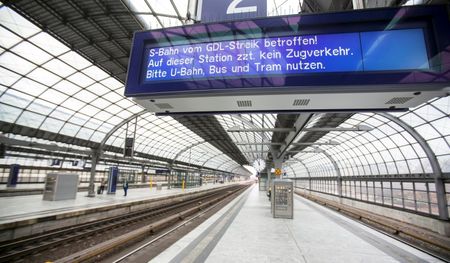By Peter Maushagen
FRANKFURT (Reuters) - A German court dismissed an attempt on Thursday by rail operator Deutsche Bahn to halt a nationwide strike that has paralysed the country and threatens to keep people from attending weekend celebrations of the 25th anniversary of the Berlin Wall's fall.
Labour court judge Ursula Schmidt ruled on Thursday the strike, which stopped commuter travel from early in the morning, does not violate German law and is not out of proportion.
"Strikes have major impacts and cause major damage," Schmidt told reporters in Frankfurt shortly before midnight on Thursday after six hours of deliberations. "But that's what strikes are all about."
The decision means that the action over negotiating rights and pay will continue until Monday, idling some 196,000 Deutsche Bahn workers and millions of travellers in a country where strikes are rare.
The GDL drivers' union accuses the railway of denying it the right to negotiate for 17,000 train stewards. It wants a 5 percent pay increase and a reduction in the working week to 37 hours from 39 hours.
State-owned rail operator Deutsche Bahn had filed the injunction to halt the strike after the GDL rejected an offer of mediation and began what will become the longest strike in the German railway's post-war history.
Deutsche Bahn had hoped the court would stop the strike and appoint mediators. Deutsche Bahn, which had seen the chances of success in court as limited, will appeal the decision, according to its lawyer, Thomas Ubber.
A court spokeswoman said the negotiations at the next court session were likely to begin at 10:30 a.m. on Friday. A compromise proposal Schmidt made on Thursday was ultimately rejected by both sides.
"That was a smart proposal by the court," said Ulrich Weber, a Deutsche Bahn board member. "Neither side would have had to make concessions. It was only a proposal to move the process forward without burdening customers further."
About 5.5 million Germans travel by rail each day, relying on the high-speed lines that criss-cross the country. About one-fifth of German freight is also transported by rail, which has been idled by the strike since Wednesday, costing companies dearly.
Economists estimate a strike of more than three days could cost the economy up to 100 million euros ($126 million) a day if assembly lines have to shut because of supply shortages.
Strikes in Germany are relatively rare because employers and larger unions are usually able to resolve their differences at the negotiating table. GDL had held a 60-hour strike on a school holiday weekend last month, stranding millions.
The train drivers have been pilloried in the media, with Die Welt newspaper referring to it as a "stupid strike" on its front page and top-selling Bild calling it a "monster strike."
Even Chancellor Angela Merkel, who rarely gets involved in industrial disputes, appealed to the train drivers' "sense of responsibility" on Wednesday and urged mediation.
Merkel's government is working on a new law to limit the power of smaller unions like the GDL.

The industries most affected by rail freight disruptions are carmakers, chemicals companies and steel producers. Car makers have tried to redirect some of their supplies. Volkswagen, BMW and Audi say their goal is to prevent any stoppages in production.
(Reporting by Peter Maushagen,; Writing by Erik Kirschbaum; Editing by Alan Crosby; editing by Chris Reese)
